#include <SM_Test.h>
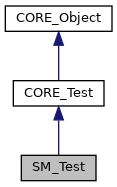
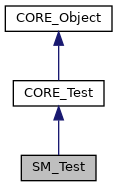
Public Member Functions | |
| SM_Test (void) | |
| create the class More... | |
| virtual | ~SM_Test (void) |
| destroy the class More... | |
| virtual tMemSize | getMemorySize () const override |
| return the memory size of the class More... | |
| virtual tBoolean | execute (const CORE_Run &runner, const std::map< tString, tString > &options) const |
| execute the tests More... | |
| void | setName (const tString &name) |
| set the test name More... | |
| const tString & | getName () const |
| get the test name More... | |
| template<typename T , class I > | |
| requires core_functions::isArithmeticType< T > tBoolean | testArray (CORE_Array< T, I > &A) const |
| template<typename T , typename K , K D, class S , class I > | |
| tBoolean | testField (CORE_Field< T, K, D, S, I > &A) const |
| template<class T > | |
| std::shared_ptr< T > | getSharedPointer () |
| return the shared pointer for this More... | |
| template<class T > | |
| std::shared_ptr< const T > | getConstSharedPointer () const |
| return a const shared pointer for this More... | |
| virtual tMemSize | getContentsMemorySize () const |
| return nthe memory size of the included associations More... | |
| template<class T > | |
| tBoolean | isInstanceOf () const |
| test if the clas T is an instance of this class More... | |
| tString | getClassName () const |
| return the name of the class More... | |
| tString | getPointerString () const |
| retrun the pointer of the class as a string More... | |
| tString | getIdentityString () const |
| retrun the string identification of the class More... | |
| virtual tString | toString () const |
| return the string representation of the object node More... | |
Static Public Member Functions | |
| static CORE_UniquePointer< CORE_Test > | New () |
| create a test class @retrun a new instance of the class More... | |
| static tBoolean | EnableMemoryStack (const tBoolean &isMemoryChecked) |
| enable the memory stack More... | |
| static void | EnableMemoryStack () |
| enable the memory stack More... | |
| static void | DisableMemoryStack () |
| disable the memory stack More... | |
| static tBoolean | IsMemoryStackEnabled () |
| return trur if the memory stack is enabled More... | |
| static tString | MemoryStackToString () |
| get the memory stack in string More... | |
| static tIndex | GetRegisteredClassesNumber () |
| get the memory stack in string More... | |
Protected Member Functions | |
| virtual void | getSearchingPaths (std::vector< tString > &vpaths) const override |
| get the test path locations More... | |
| virtual tBoolean | primaryTests (const CORE_Run &runner, const std::map< tString, tString > &options) const override |
| execute the primary tests More... | |
| virtual tBoolean | elementaryTests (const CORE_Run &runner, const std::map< tString, tString > &options) const override |
| execute the elementary tests More... | |
| virtual tBoolean | caseTests (const CORE_Run &runner, const std::map< tString, tString > &options) const override |
| execute the case tests More... | |
| void | getSearchingPaths (const tString &packageName, const tUSInt &nLevels, const std::vector< tString > &localPaths, std::vector< tString > &vpaths) const |
| get the test path locations More... | |
| tString | getSearchingPathsToString () const |
| get the test path locations into string More... | |
| tString | searchPath (const tString &f) const |
| retun the path where the file f is withing the searching paths list More... | |
| tBoolean | testCase (const CORE_Run &runner, const tString &name) const |
| execute the test case More... | |
| virtual tBoolean | compareResults (const std::map< tString, tString > &options, const tString &resultFile, const tString &referenceFile, const tReal &eps) const |
| make the difference between the two files More... | |
| tBoolean | testArray (const CORE_Run &runner, const std::map< tString, tString > &options) const |
| test the numeric array More... | |
| template<typename Q , class I > | |
| requires core_functions::isArithmeticType< Q > tBoolean | testArray (CORE_Array< Q, I > &A) const |
| template<typename T , class I > | |
| tBoolean | uniformRandomTest (CORE_Array< T, I > &A, CORE_Array< T, I > &B) const |
| randomizer test More... | |
| template<typename Q , typename K , K D, class S , class I > | |
| tBoolean | testField (CORE_Field< Q, K, D, S, I > &A) const |
Static Protected Member Functions | |
| template<typename T , typename Q > | |
| requires core_functions::isRealType< T > static core_functions::isRealType< Q > tBoolean | Equals (const T &a, const Q &b) |
| retrun true if the two values are equals More... | |
| template<typename T , typename Q > | |
| requires core_functions::isIntegerType< T > &&static core_functions::isIntegerType< Q > tBoolean | Equals (const T &a, const Q &b) |
Private Member Functions | |
| tBoolean | testNormalLaw (const CORE_Run &runner, const std::map< tString, tString > &options) const |
| test the normal law More... | |
| tBoolean | testField (const CORE_Run &runner, const std::map< tString, tString > &options) const |
| test the field More... | |
| tBoolean | testVirtualMethods (const CORE_Run &runner, const std::map< tString, tString > &options) const |
| test the efficiency of the templated method vs virtual method More... | |
| tBoolean | testOperators (const CORE_Run &runner, const std::map< tString, tString > &options) const |
| test the oparator by appling the formule dE/dM=-H More... | |
| tBoolean | testEnergyOperatorsDerivatives (SM_Beam &beam, const tIndex &Nx, const tIndex &Ny, const tIndex &Nz) const |
| test the Energy & H relations with the formulat dE/dmu=_H on a grid of size Nx x Ny x Nz More... | |
| tBoolean | linedParticlesTestCase (const CORE_Run &runner, const std::array< tReal, 3 > &Mu0, const tBoolean &hasZeeman, const tReal &J, const tBoolean &hasSelfInteraction, const tIndex &n, const tReal &h, const tString &system, const tString &noise, const tReal &T, const tReal &dt) const |
| test n particles on a 3D- line with system & noise function More... | |
| tBoolean | grid3DParticlesTestCase (const CORE_Run &runner, const tIndex &Nx, const tIndex &Ny, const tIndex &Nz, const tReal &J, const tBoolean &hasSelfInteraction, const tString &systemName, const tString &noiseName) const |
| test Nx x Ny x Nz particles on a 3D-grid with system & noise function More... | |
| tBoolean | validate (const CORE_Run &runner, const tString &path, const tString &prefix, const SM_Beam &beam, const tIndex &s) const |
| validate the s-trajectory of the beam simulations More... | |
| tBoolean | testDerivative (const tIndex &i, const tDimension &d, const SM_Network &network, SM_RealField &Mu, const SM_Operator &op, SM_RealField &H) const |
| test derivative of the operator at particle i in the direction d on the network at Mu More... | |
| tBoolean | testTypes (const CORE_Run &runner, const std::map< tString, tString > &options) const |
| test type More... | |
| tBoolean | testIO (const CORE_Run &runner, const std::map< tString, tString > &options) const |
| test IO class More... | |
| tBoolean | testChrono (const CORE_Run &runner, const std::map< tString, tString > &options) const |
| test Chrono class More... | |
| tBoolean | testMemorySize (const CORE_Run &runner, const std::map< tString, tString > &options) |
| test memory size More... | |
| tBoolean | testStringsList (const CORE_Run &runner, const std::map< tString, tString > &options) const |
| test the string array More... | |
| tBoolean | testLoops (const CORE_Run &runner, const std::map< tString, tString > &options) const |
| test the string array More... | |
| template<class T > | |
| std::shared_ptr< T > | setThis (std::unique_ptr< T, CORE_Object::Delete > &up) |
| set the shared pointer from an unique pointer More... | |
Private Attributes | |
| tString | mName |
| std::weak_ptr< CORE_Object > | mThis |
Static Private Attributes | |
| static const tFlag | ALL_TESTS =0 |
| static const tFlag | PRIMARY_TESTS =1 |
| static const tFlag | ELEMENTARY_TESTS =2 |
| static const tFlag | CASE_TESTS =3 |
Constructor & Destructor Documentation
◆ SM_Test()
| SM_Test::SM_Test | ( | void | ) |
create the class
◆ ~SM_Test()
|
virtual |
destroy the class
Member Function Documentation
◆ caseTests()
◆ compareResults()
|
protectedvirtualinherited |
make the difference between the two files
- Parameters
-
[in] options optons of the program [in] resultFile result file generated by the program [in] referenceFile reference file [in] eps tolerated error
- Returns
- true if the difference between two file are les than eps
Referenced by CORE_Test::testCase().

◆ DisableMemoryStack()
|
inlinestaticinherited |
disable the memory stack
Referenced by CORE_Object::EnableMemoryStack().

◆ elementaryTests()
|
overrideprotectedvirtual |
execute the elementary tests
- Parameters
-
[in] runner runner of the program [in] options options of the program
- Returns
- false if the tests have failed
Reimplemented from CORE_Test.
References grid3DParticlesTestCase(), linedParticlesTestCase(), CORE_Run::Out(), CORE_Out::printError(), tBoolean, testVirtualMethods(), tIndex, and tString.
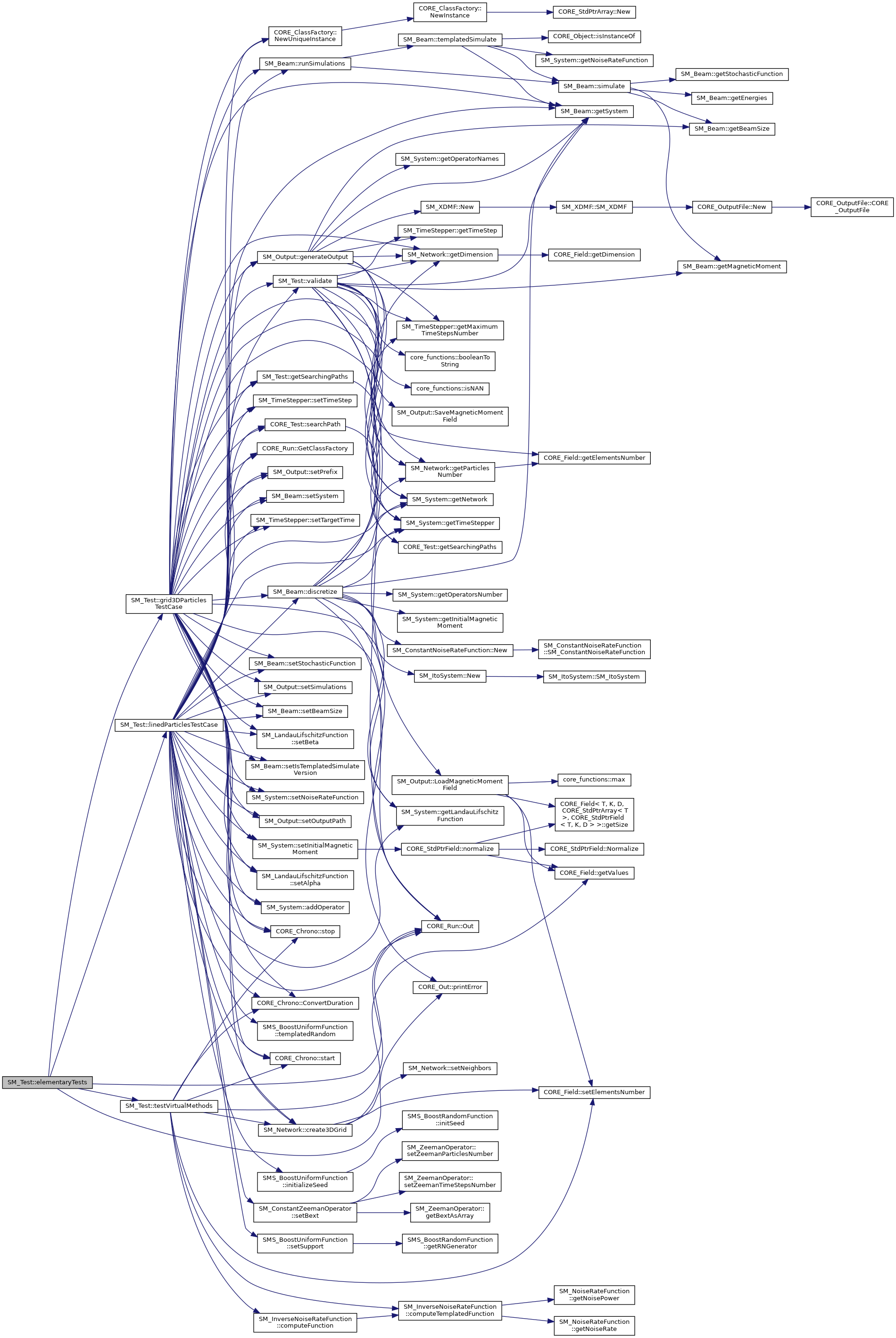
◆ EnableMemoryStack() [1/2]
|
inlinestaticinherited |
enable the memory stack
Referenced by CORE_Object::EnableMemoryStack(), and CORE_Run::SetDebugOptions().

◆ EnableMemoryStack() [2/2]
|
inlinestaticinherited |
enable the memory stack
- Parameters
-
[in] isMemoryChecked : true to verify memory allocation of CORE_Object classes
- Returns
- true if the memroy is checked
References CORE_Object::DisableMemoryStack(), CORE_Object::EnableMemoryStack(), and CORE_Object::IsMemoryStackEnabled().

◆ Equals() [1/2]
|
inlinestaticprotectedinherited |
retrun true if the two values are equals
- Parameters
-
[in] a : argument to compare [in] b : argument to compare
- Returns
- true if a==b
Referenced by CORE_Test::testArray(), and CORE_Test::testField().

◆ Equals() [2/2]
|
inlinestaticprotectedinherited |
◆ execute()
|
virtualinherited |
execute the tests
- Parameters
-
[in] runner the runner of the tests [in] options the options of the program
References CORE_Test::ALL_TESTS, CORE_Test::CASE_TESTS, CORE_Test::caseTests(), CORE_Test::ELEMENTARY_TESTS, CORE_Test::elementaryTests(), CORE_Run::Out(), CORE_Test::PRIMARY_TESTS, CORE_Test::primaryTests(), tBoolean, CORE_Test::testCase(), tFlag, and tString.
Referenced by CORE_Run::makeTests(), and SM_Run::makeTests().
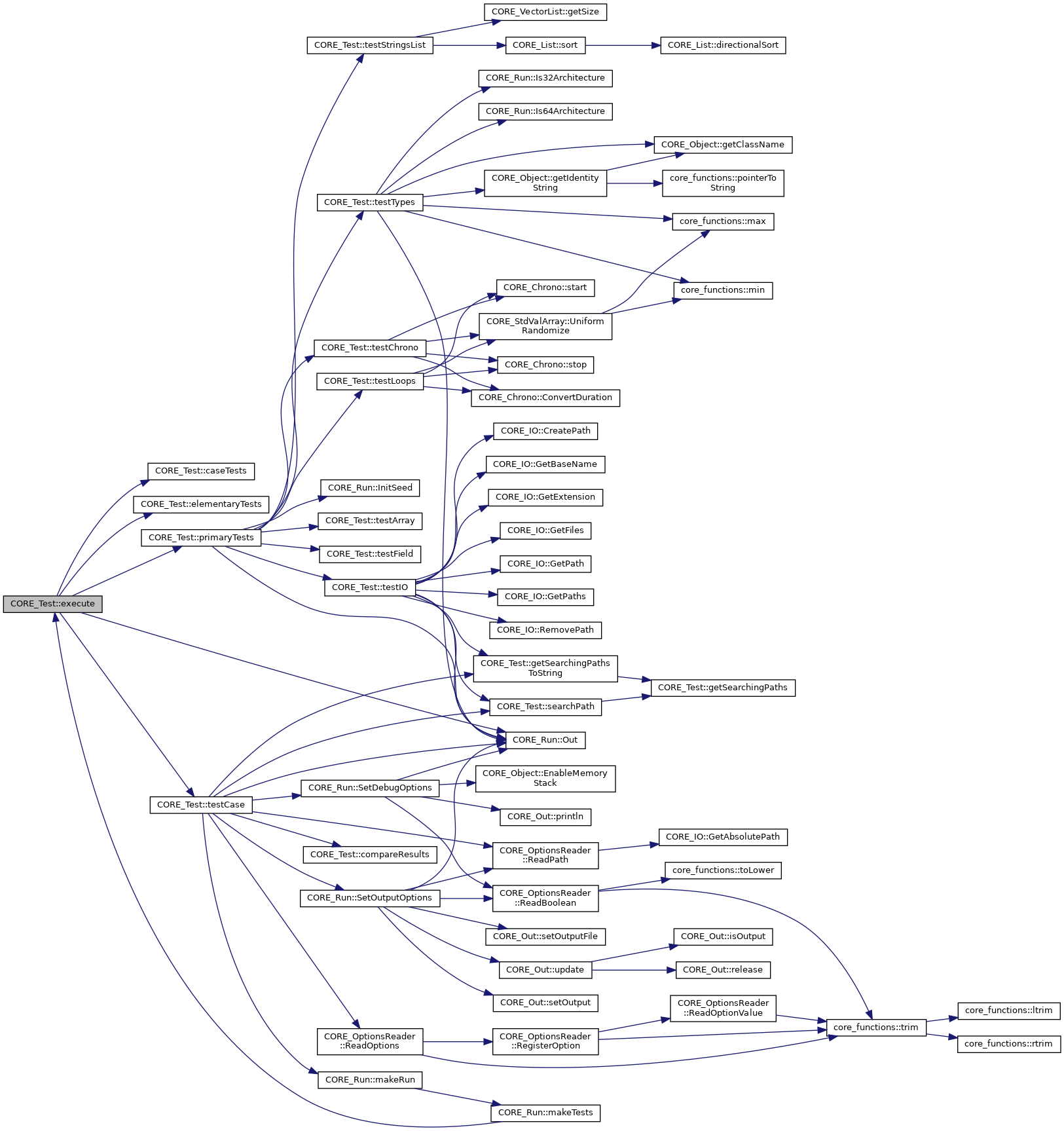

◆ getClassName()
|
inlineinherited |
return the name of the class
- Returns
- the string name of the class
Referenced by CORE_Object::getIdentityString(), and CORE_Test::testTypes().

◆ getConstSharedPointer()
|
inlineinherited |
return a const shared pointer for this
- Returns
- the shared pointer as a type T
References CORE_Object::mThis.
◆ getContentsMemorySize()
|
inlinevirtualinherited |
return nthe memory size of the included associations
- Returns
- the memory size of the storage in bytes 1 Kb = 1024 bytes 1 Mb = 1024 Kb 1 Gb = 1024 Mb 1 Tb = 1024 Gb 1 Hb = 1024 Tb
Reimplemented in CORE_VectorList< T, I >, CORE_VectorList< tString, CORE_StringsList >, CORE_ValArray< T, I >, CORE_ValArray< T, CORE_StdValArray< T > >, CORE_Run, CORE_PtrArray< T, I >, CORE_PtrArray< T, CORE_StdPtrArray< T > >, CORE_Field< T, K, D, S, I >, CORE_Field< T, K, D, CORE_StdPtrArray< T >, CORE_StdPtrField< T, K, D > >, CORE_Field< T, K, D, CORE_StdValArray< T >, CORE_StdValField< T, K, D > >, CORE_ClassFactory, SMS_STDUniformFunction, SMS_STDNormalFunction, SMS_BoostUniformFunction, SMS_BoostNormalFunction, SM_ZeemanOperator, SM_XDMF, SM_VTK, SM_System, SM_Output, SM_Operator, SM_Network, SM_DemagnetizedOperator, SM_Beam, CORE_StringsList, and CORE_Out.
Referenced by CORE_Out::getContentsMemorySize(), SM_Beam::getContentsMemorySize(), SM_Network::getContentsMemorySize(), SM_Operator::getContentsMemorySize(), SM_Output::getContentsMemorySize(), SM_System::getContentsMemorySize(), SM_VTK::getContentsMemorySize(), SMS_BoostNormalFunction::getContentsMemorySize(), SMS_BoostUniformFunction::getContentsMemorySize(), SMS_STDNormalFunction::getContentsMemorySize(), SMS_STDUniformFunction::getContentsMemorySize(), CORE_ClassFactory::getContentsMemorySize(), CORE_PtrArray< T, I >::getContentsMemorySize(), CORE_ValArray< T, I >::getContentsMemorySize(), CORE_VectorList< T, I >::getContentsMemorySize(), CORE_Object::getMemorySize(), SM_ConstantNoiseRateFunction::getMemorySize(), SM_InverseNoiseRateFunction::getMemorySize(), SM_LandauLifschitzFunction::getMemorySize(), SM_NoiseRateFunction::getMemorySize(), SM_Object::getMemorySize(), SM_StochasticFunction::getMemorySize(), SM_TemplatedNoiseRateFunction< DerivedClass >::getMemorySize(), SM_TimeStepper::getMemorySize(), SMS_BoostRandomFunction::getMemorySize(), CORE_Array< T, I >::getMemorySize(), CORE_Chrono::getMemorySize(), CORE_Collection< T, I >::getMemorySize(), CORE_IO::getMemorySize(), CORE_List< T, K, I >::getMemorySize(), CORE_OptionsReader::getMemorySize(), CORE_OutputFile::getMemorySize(), and CORE_Test::getMemorySize().

◆ getIdentityString()
|
inlineinherited |
retrun the string identification of the class
- Returns
- the string identity of the class
References CORE_Object::getClassName(), and core_functions::pointerToString().
Referenced by CORE_Test::testArray(), CORE_Test::testField(), CORE_Test::testTypes(), CORE_Object::toString(), CORE_ClassFactory::toString(), and CORE_Field< T, K, D, S, I >::toString().


◆ getMemorySize()
|
inlineoverridevirtualinherited |
return the memory size of the class
- Returns
- the memory size of the class in bytes 1 octet = 1 byte 1 Ko = 1024 bytes 1 Mo = 1024 Ko 1 Go = 1024 Mo
Reimplemented from CORE_Object.
References CORE_Object::getContentsMemorySize().

◆ getName()
|
inlineinherited |
◆ getPointerString()
|
inlineinherited |
retrun the pointer of the class as a string
- Returns
- the pointer of the calss as a string
References core_functions::pointerToString().

◆ GetRegisteredClassesNumber()
|
inlinestaticinherited |
get the memory stack in string
- Returns
- the string representation of the memory stack
◆ getSearchingPaths() [1/2]
◆ getSearchingPaths() [2/2]
|
inlineoverrideprotectedvirtual |
get the test path locations
- Parameters
-
[out] vpaths : the return path location s
Reimplemented from CORE_Test.
References CORE_Test::getSearchingPaths().
Referenced by grid3DParticlesTestCase(), and linedParticlesTestCase().


◆ getSearchingPathsToString()
|
protectedinherited |
get the test path locations into string
- Returns
- all the sarching path in string
References CORE_Test::getSearchingPaths().
Referenced by CORE_Test::testCase(), and CORE_Test::testIO().


◆ getSharedPointer()
|
inlineinherited |
return the shared pointer for this
- Returns
- the shared pointer as a type T
References CORE_Object::mThis.
◆ grid3DParticlesTestCase()
|
private |
test Nx x Ny x Nz particles on a 3D-grid with system & noise function
- Parameters
-
[in] runner runner of the program [in] Nx : number of particles in the x-direction [in] Ny : number of particles in the y-direction [in] Nz : number of particles in the z-direction [in] J : constant heissengerg coefficient [in] hasSelfInteraction : true to interact a particle with itself [in] systemName : name of the system [in] noiseName : name of the noise
References SM_System::addOperator(), CORE_Chrono::ConvertDuration(), SM_Network::create3DGrid(), SM_Beam::discretize(), SM_Output::generateOutput(), CORE_Run::GetClassFactory(), SM_Network::getDimension(), SM_System::getLandauLifschitzFunction(), SM_System::getNetwork(), SM_Network::getParticlesNumber(), getSearchingPaths(), SM_Beam::getSystem(), SM_System::getTimeStepper(), CORE_ClassFactory::NewUniqueInstance(), CORE_Run::Out(), SM_Beam::runSimulations(), CORE_Test::searchPath(), SM_LandauLifschitzFunction::setAlpha(), SM_Beam::setBeamSize(), SM_LandauLifschitzFunction::setBeta(), SM_System::setInitialMagneticMoment(), SM_Beam::setIsTemplatedSimulateVersion(), SM_System::setNoiseRateFunction(), SM_Output::setOutputPath(), SM_Output::setPrefix(), SM_Output::setSimulations(), SM_Beam::setStochasticFunction(), SM_Beam::setSystem(), SM_TimeStepper::setTargetTime(), SM_TimeStepper::setTimeStep(), CORE_Chrono::start(), CORE_Chrono::stop(), tBoolean, tIndex, tReal, tString, tUInt, and validate().
Referenced by elementaryTests().
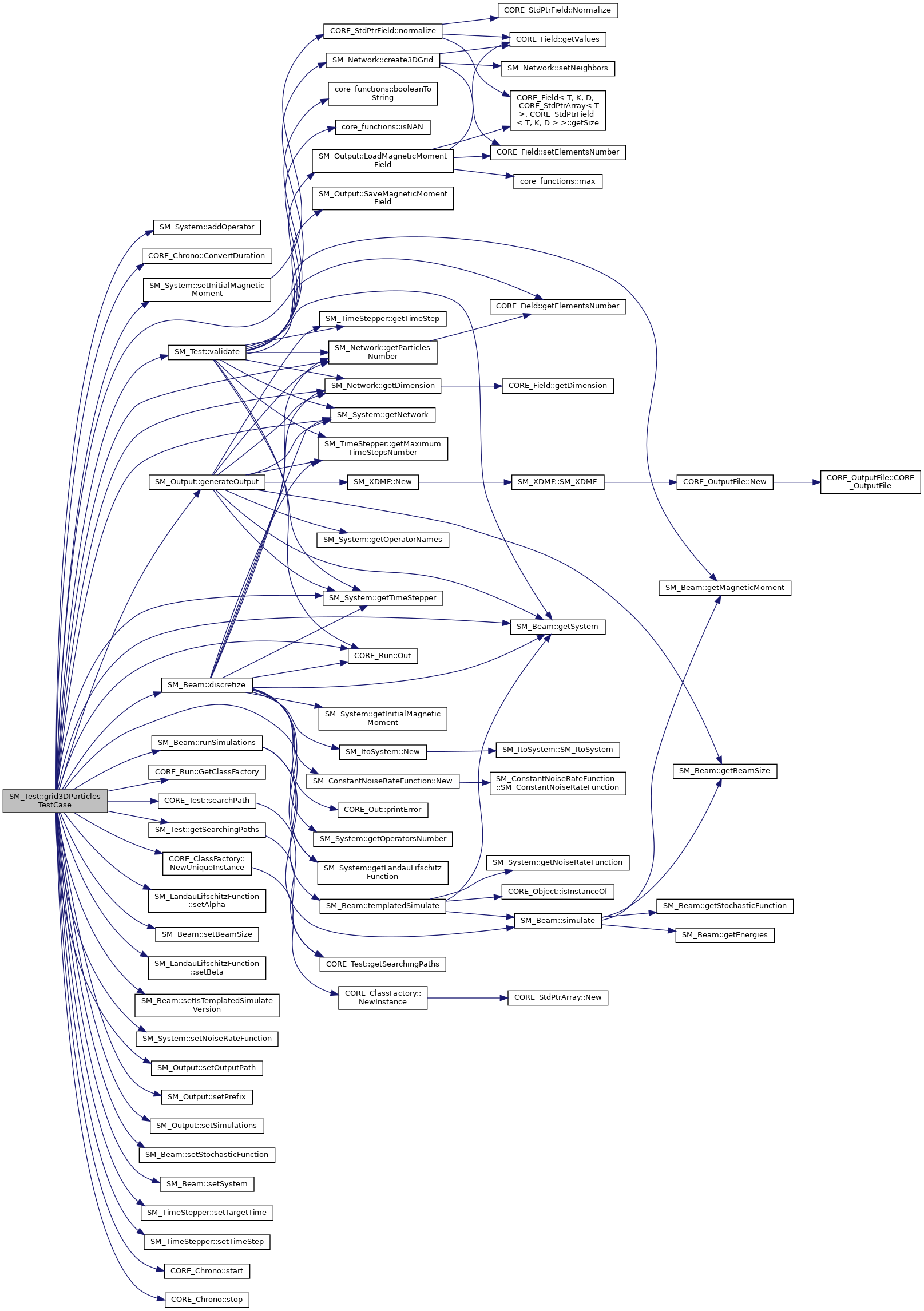

◆ isInstanceOf()
|
inlineinherited |
test if the clas T is an instance of this class
- Returns
- true if the object is an instance of T
Referenced by SM_Beam::templatedSimulate().

◆ IsMemoryStackEnabled()
|
inlinestaticinherited |
return trur if the memory stack is enabled
Referenced by CORE_Object::EnableMemoryStack(), and main().

◆ linedParticlesTestCase()
|
private |
test n particles on a 3D- line with system & noise function
- Parameters
-
[in] runner runner of the program [in] Mu0 : initial magnetic moment [in] hasZeeman : true if there is an external magnetic field [in] J : exchange factor [in] hasSelfInteraction : true to interact a particle with itself [in] n : number of particles [in] h : distance between 2 particles [in] system : name of the system [in] noise : name of the noise [in] T : target time [in] dt : time step
References SM_System::addOperator(), CORE_Chrono::ConvertDuration(), SM_Network::create3DGrid(), SM_Beam::discretize(), SM_Output::generateOutput(), CORE_Run::GetClassFactory(), SM_System::getLandauLifschitzFunction(), SM_System::getNetwork(), getSearchingPaths(), SM_Beam::getSystem(), SM_System::getTimeStepper(), SMS_BoostUniformFunction::initializeSeed(), CORE_ClassFactory::NewUniqueInstance(), CORE_Run::Out(), SM_Beam::runSimulations(), CORE_Test::searchPath(), SM_LandauLifschitzFunction::setAlpha(), SM_Beam::setBeamSize(), SM_LandauLifschitzFunction::setBeta(), SM_ConstantZeemanOperator::setBext(), SM_System::setInitialMagneticMoment(), SM_Beam::setIsTemplatedSimulateVersion(), SM_System::setNoiseRateFunction(), SM_Output::setOutputPath(), SM_Output::setPrefix(), SM_Output::setSimulations(), SM_Beam::setStochasticFunction(), SMS_BoostUniformFunction::setSupport(), SM_Beam::setSystem(), SM_TimeStepper::setTargetTime(), SM_TimeStepper::setTimeStep(), CORE_Chrono::start(), CORE_Chrono::stop(), tBoolean, SMS_BoostUniformFunction::templatedRandom(), tIndex, tReal, tString, tUInt, and validate().
Referenced by elementaryTests().
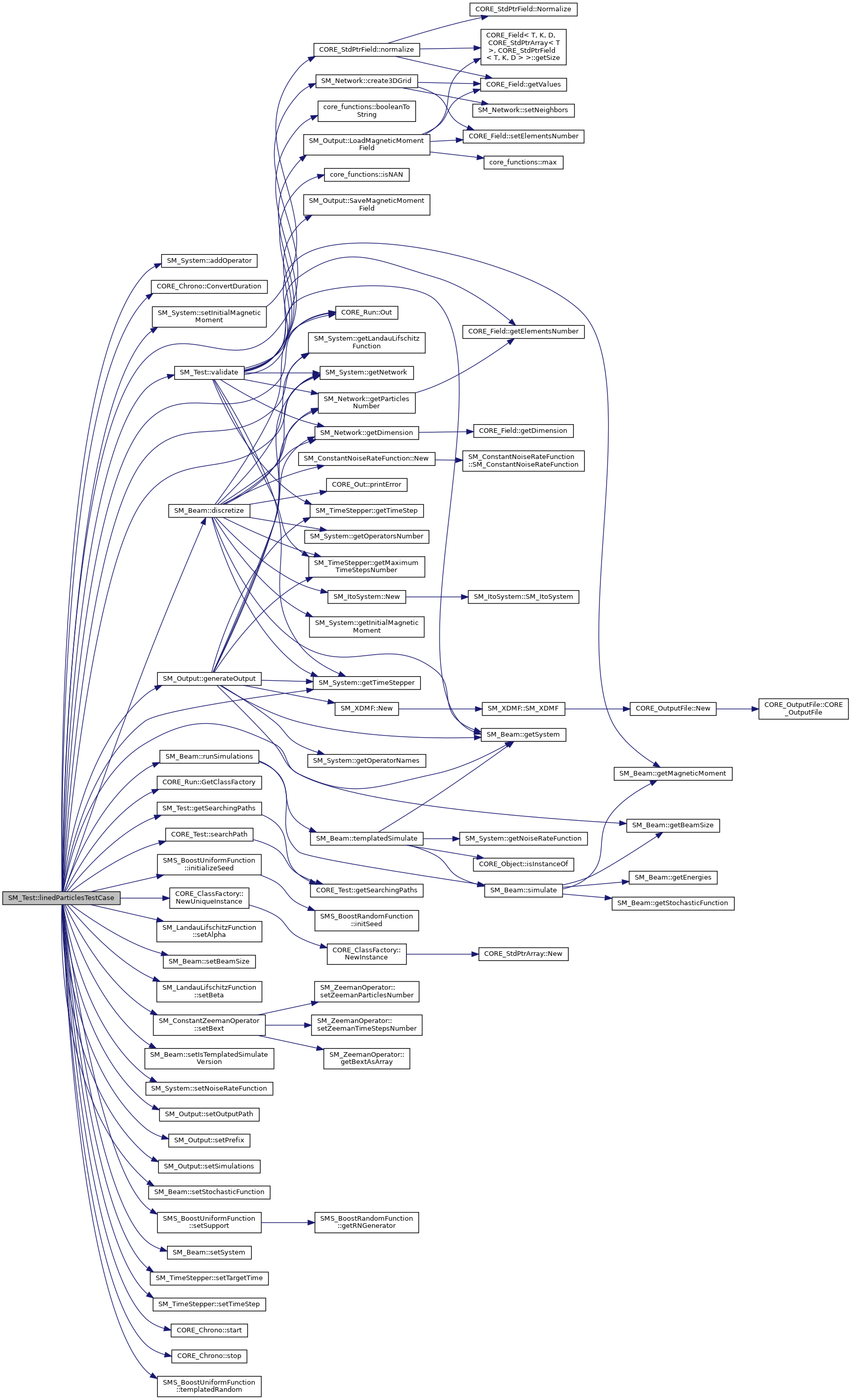

◆ MemoryStackToString()
|
inlinestaticinherited |
get the memory stack in string
- Returns
- the string representation of the memory stack
Referenced by main().

◆ New()
|
inlinestaticinherited |
create a test class @retrun a new instance of the class
References CORE_Test::CORE_Test().

◆ primaryTests()
|
overrideprotectedvirtual |
execute the primary tests
- Parameters
-
[in] runner runner of the program [in] options options of the program
- Returns
- false if the tests have failed
Reimplemented from CORE_Test.
References CORE_Run::Out(), CORE_Out::printError(), tBoolean, testField(), testNormalLaw(), testOperators(), and tString.
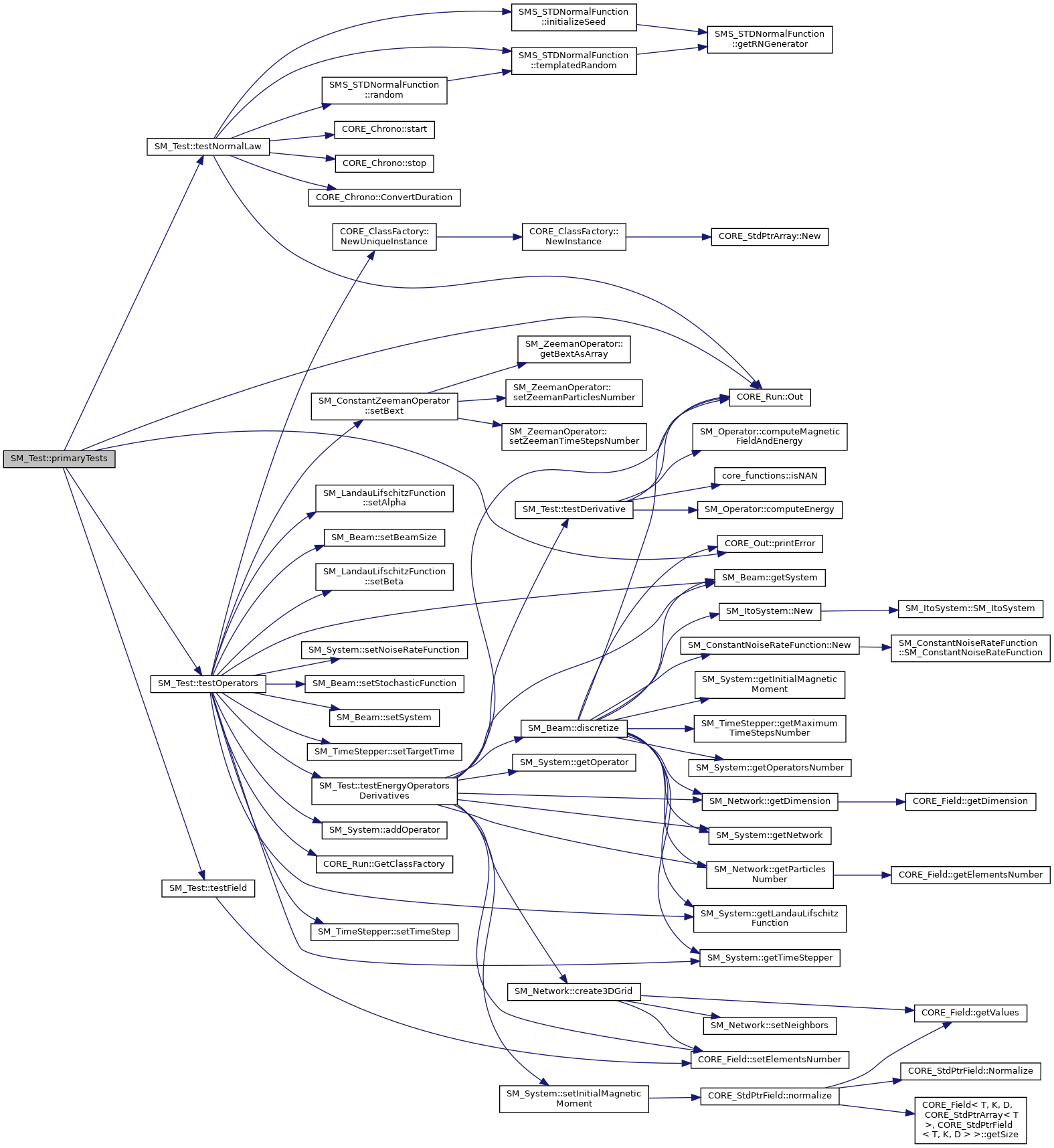
◆ searchPath()
retun the path where the file f is withing the searching paths list
- Parameters
-
[in] f : file to search
- Returns
- the path form the current exceutable file where the file f is
References CORE_Test::getSearchingPaths().
Referenced by grid3DParticlesTestCase(), linedParticlesTestCase(), CORE_Test::testCase(), and CORE_Test::testIO().


◆ setName()
|
inlineinherited |
◆ setThis()
|
inlineprivateinherited |
set the shared pointer from an unique pointer
- Parameters
-
[in,out] up unique pointer of the class at input, points to null pointer at output
- Returns
- the shared pointer of the class
Method only calledby the friend class CORE_ClassFactory::NewSharedInstance()
References CORE_Object::mThis.
◆ testArray() [1/3]
|
protectedinherited |
test the numeric array
- Parameters
-
[in] runner the runner of the tests [in] options the options of the program
References tBoolean.
Referenced by CORE_Test::primaryTests().

◆ testArray() [2/3]
|
protectedinherited |
◆ testArray() [3/3]
|
inherited |
References CORE_Array< T, I >::axpy(), CORE_Collection< T, I >::cbegin(), CORE_Collection< T, I >::cend(), CORE_Chrono::ConvertDuration(), CORE_Array< T, I >::copy(), CORE_Object::CORE_Object(), CORE_Test::Equals(), CORE_Array< T, I >::get(), CORE_ValArray< T, I >::getArray(), CORE_Object::getIdentityString(), CORE_Array< T, I >::getMemorySize(), CORE_Collection< T, I >::getSize(), CORE_ValArray< T, I >::getSize(), CORE_Array< T, I >::l2Distance(), CORE_Array< T, I >::linfDistance(), CORE_Array< T, I >::prod(), CORE_Collection< T, I >::setSize(), CORE_Chrono::start(), CORE_Chrono::stop(), CORE_Array< T, I >::sum(), CORE_Array< T, I >::swap(), tBoolean, tIndex, tInteger, tMemSize, CORE_StdValArray< T >::transform(), tReal, tULLInt, and CORE_Array< T, I >::uniformRandomize().

◆ testCase()
|
protectedinherited |
execute the test case
- Parameters
-
[in] runner : runner of the test [in] name name of the case which must correspond the same local path
- Returns
- true if the tests have succeeded
- reads the options file 'options.txt' within the local test case path with name 'name'
- the current path becomes the path where the options file is
- executes the program. If it fails return false
- reads the tolerance error in 'eps' key value within options
- reads the output path from 'output-path' key value within options
- reads the reference path from 'reference-path' key value within options
- reads the output file 'output-file' key value within options
- reads the prefix from 'prefix' key value within options
- make the difference betwen the result file and the refence file
References CORE_Test::compareResults(), CORE_Test::getSearchingPathsToString(), CORE_Run::makeRun(), CORE_Run::Out(), CORE_OptionsReader::ReadOptions(), CORE_OptionsReader::ReadPath(), CORE_Test::searchPath(), CORE_Run::SetDebugOptions(), CORE_Run::SetOutputOptions(), tBoolean, tReal, and tString.
Referenced by CORE_Test::execute().
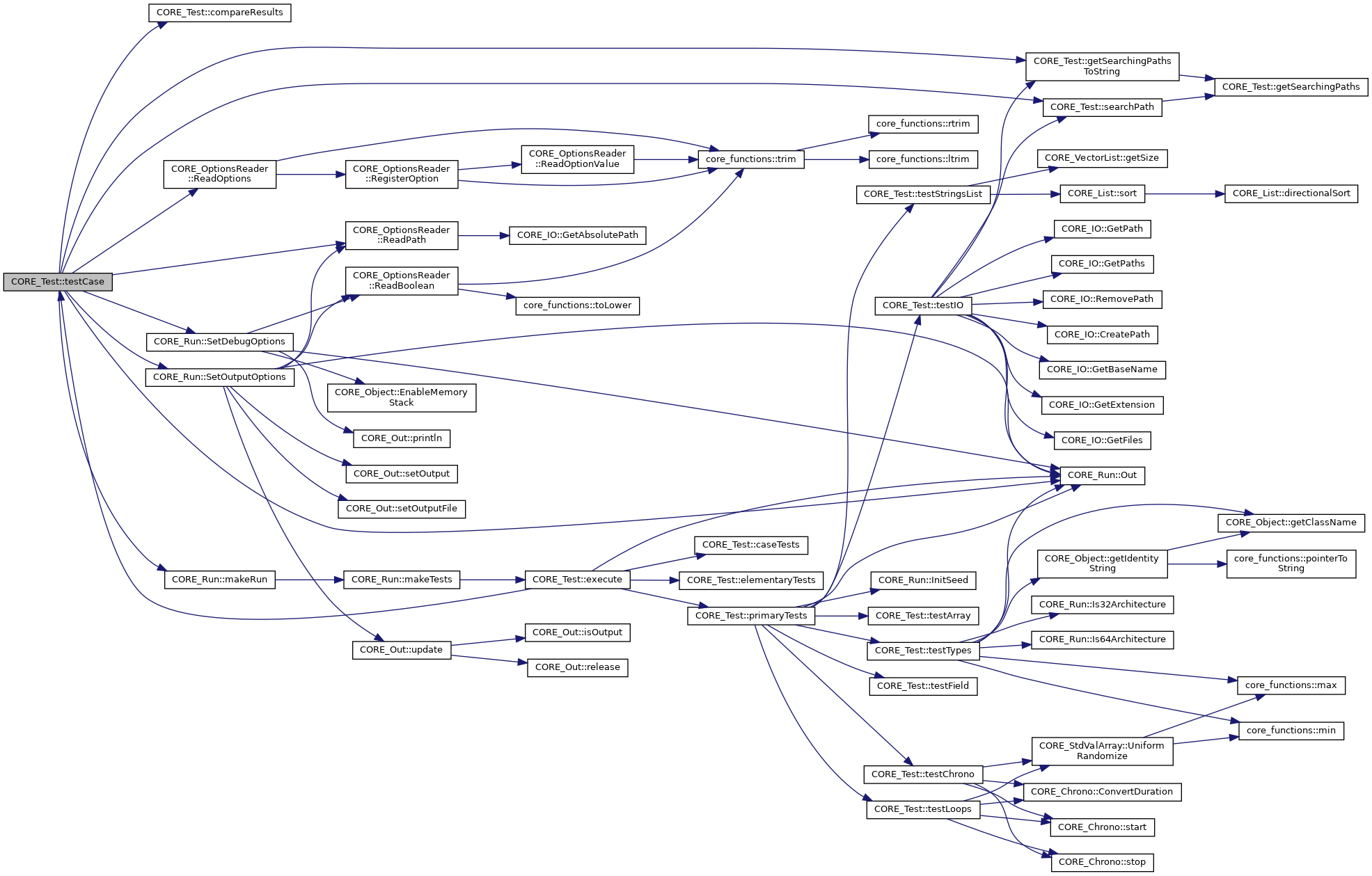

◆ testChrono()
|
privateinherited |
test Chrono class
- Parameters
-
[in] runner the runner of the tests [in] options the options of the program
- Returns
- true if the tests have succeeded
References CORE_Chrono::ConvertDuration(), CORE_Chrono::start(), CORE_Chrono::stop(), tIndex, tReal, tUInt, tUSInt, and CORE_StdValArray< T >::UniformRandomize().
Referenced by CORE_Test::primaryTests().


◆ testDerivative()
|
private |
test derivative of the operator at particle i in the direction d on the network at Mu
- Parameters
-
[in] i : index of the point [in] d : direction of derivation [in] network : network of particles [in,out] Mu : magnetic moment [in] op : operator to test [out] H : magnetic field
- Returns
- true if the derivative is ok by comparison with the taylor expansion of order 2.
References SM_Operator::computeEnergy(), SM_Operator::computeMagneticFieldAndEnergy(), core_functions::isNAN(), CORE_Run::Out(), tBoolean, and tReal.
Referenced by testEnergyOperatorsDerivatives().
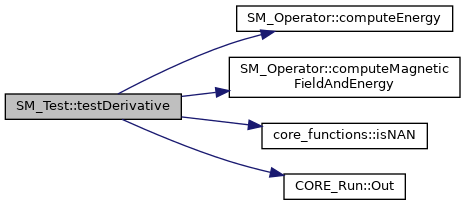

◆ testEnergyOperatorsDerivatives()
|
private |
test the Energy & H relations with the formulat dE/dmu=_H on a grid of size Nx x Ny x Nz
- Parameters
-
[in,out] beam : the beam to test [in] Nx : the number of particle along x [in] Ny : the number of particle along y [in] Nz : the number of particle along z
References SM_Network::create3DGrid(), SM_Beam::discretize(), SM_Network::getDimension(), SM_System::getNetwork(), SM_System::getOperator(), SM_Network::getParticlesNumber(), SM_Beam::getSystem(), CORE_Run::Out(), CORE_Field< T, K, D, S, I >::setElementsNumber(), SM_System::setInitialMagneticMoment(), tBoolean, testDerivative(), tIndex, and tReal.
Referenced by testOperators().
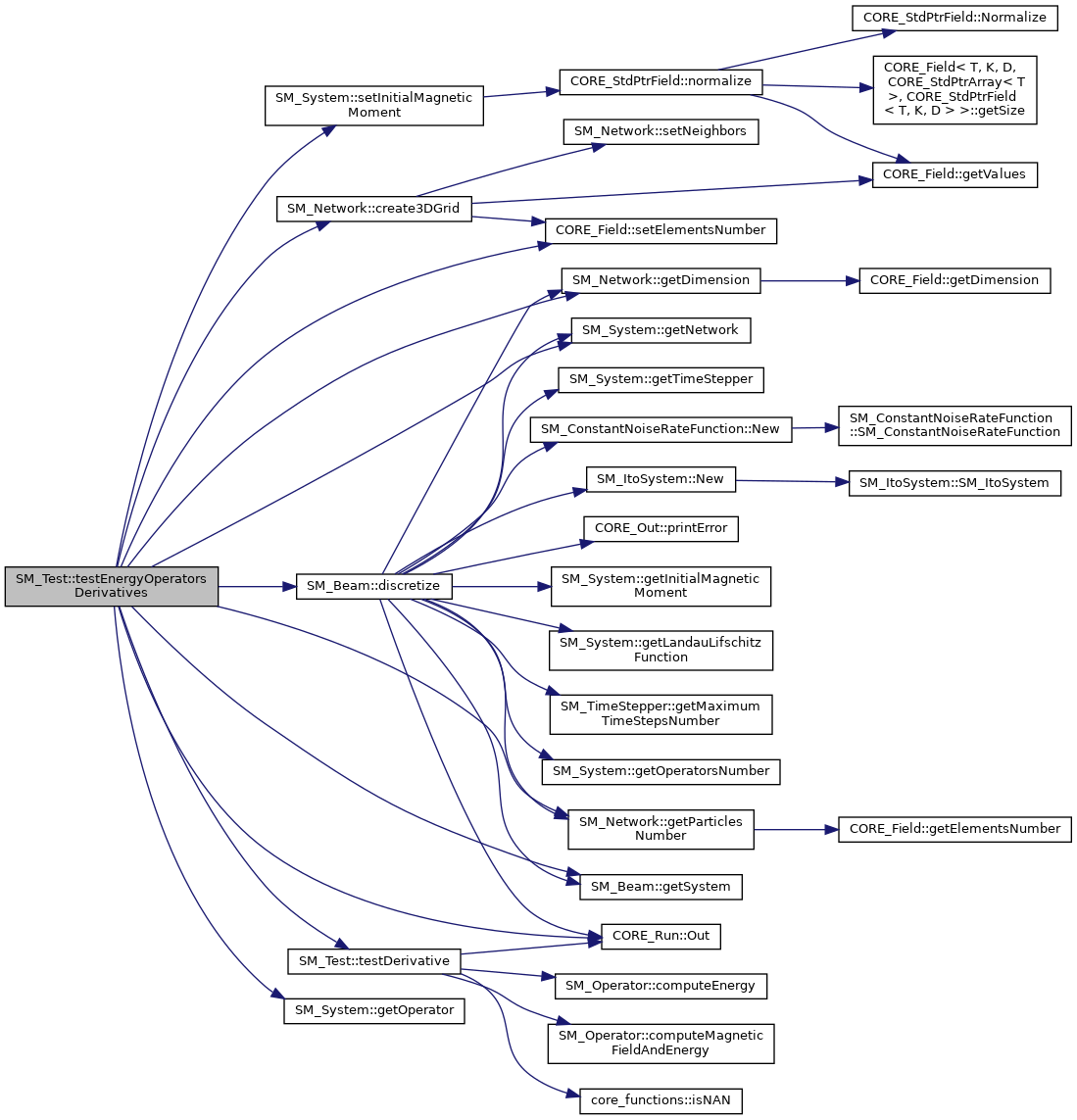

◆ testField() [1/3]
|
private |
test the field
- Parameters
-
[in] runner runner of the program [in] options options of the program
- Returns
- false if the test has failed
References CORE_Field< T, K, D, S, I >::setElementsNumber(), tBoolean, tIndex, and tUSInt.
Referenced by primaryTests().


◆ testField() [2/3]
|
protectedinherited |
◆ testField() [3/3]
|
inherited |
References CORE_Field< T, K, D, S, I >::axpy(), CORE_Chrono::ConvertDuration(), CORE_Field< T, K, D, S, I >::copy(), CORE_Field< T, K, D, S, I >::elementsTransform(), CORE_Test::Equals(), CORE_Field< T, K, D, S, I >::getElementsNumber(), CORE_Object::getIdentityString(), CORE_Field< T, K, D, S, I >::getSize(), CORE_ValArray< T, I >::getSize(), CORE_Field< T, K, D, S, I >::initialize(), CORE_Field< T, K, D, S, I >::isNANContained(), CORE_Field< T, K, D, S, I >::mod2(), CORE_Field< T, K, D, S, I >::normalize(), CORE_StdPtrArray< T >::Normalize(), CORE_Field< T, K, D, S, I >::scalarProduct(), CORE_Field< T, K, D, S, I >::setElementsNumber(), CORE_Field< T, K, D, S, I >::setSize(), CORE_Chrono::start(), CORE_Chrono::stop(), CORE_StdValArray< T >::sum(), tBoolean, tIndex, tInteger, CORE_StdValArray< T >::transform(), tReal, tULLInt, and CORE_Field< T, K, D, S, I >::uniformRandomize().

◆ testIO()
|
privateinherited |
test IO class
- Parameters
-
[in] runner the runner of the tests [in] options the options of the program
- Returns
- true if the tests have succeeded
References CORE_IO::CreatePath(), CORE_IO::GetBaseName(), CORE_IO::GetExtension(), CORE_IO::GetFiles(), CORE_IO::GetPath(), CORE_IO::GetPaths(), CORE_Test::getSearchingPathsToString(), CORE_Run::Out(), CORE_IO::RemovePath(), CORE_Test::searchPath(), tBoolean, and tString.
Referenced by CORE_Test::primaryTests().
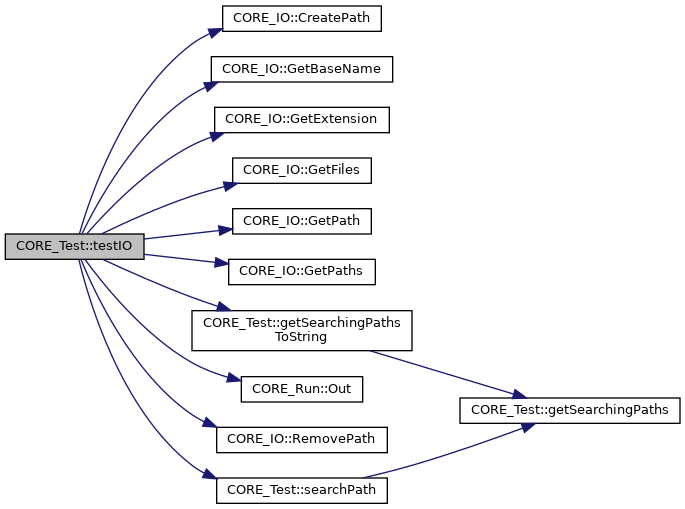

◆ testLoops()
|
privateinherited |
test the string array
- Parameters
-
[in] runner the runner of the tests [in] options the options of the program
References CORE_Chrono::ConvertDuration(), CORE_Chrono::start(), CORE_Chrono::stop(), tIndex, tReal, tULLInt, and CORE_StdValArray< T >::UniformRandomize().
Referenced by CORE_Test::primaryTests().


◆ testMemorySize()
|
privateinherited |
test memory size
- Parameters
-
[in] runner the runner of the tests [in] options the options of the program
References CORE_Object::CORE_Object(), CORE_Run::Out(), tFlag, tString, and tUCInt.

◆ testNormalLaw()
|
private |
test the normal law
- Parameters
-
[in] runner runner of the program [in] options options of the program
- Returns
- false if the test has failed
References CORE_Chrono::ConvertDuration(), SMS_STDNormalFunction::initializeSeed(), CORE_Run::Out(), SMS_STDNormalFunction::random(), CORE_Chrono::start(), CORE_Chrono::stop(), tBoolean, SMS_STDNormalFunction::templatedRandom(), tIndex, tReal, and tUInt.
Referenced by primaryTests().
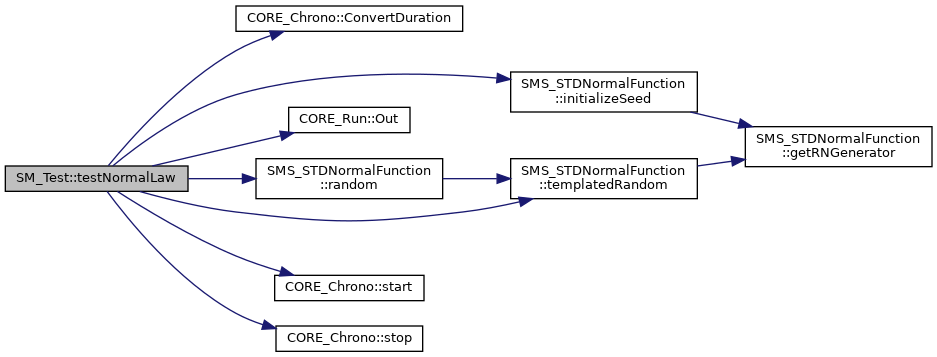

◆ testOperators()
|
private |
test the oparator by appling the formule dE/dM=-H
- Parameters
-
[in] runner runner of the program [in] options options of the program
- Returns
- false if the test has failed
References SM_System::addOperator(), CORE_Run::GetClassFactory(), SM_System::getLandauLifschitzFunction(), SM_Beam::getSystem(), SM_System::getTimeStepper(), CORE_ClassFactory::NewUniqueInstance(), SM_LandauLifschitzFunction::setAlpha(), SM_Beam::setBeamSize(), SM_LandauLifschitzFunction::setBeta(), SM_ConstantZeemanOperator::setBext(), SM_System::setNoiseRateFunction(), SM_Beam::setStochasticFunction(), SM_Beam::setSystem(), SM_TimeStepper::setTargetTime(), SM_TimeStepper::setTimeStep(), tBoolean, testEnergyOperatorsDerivatives(), tIndex, and tUInt.
Referenced by primaryTests().
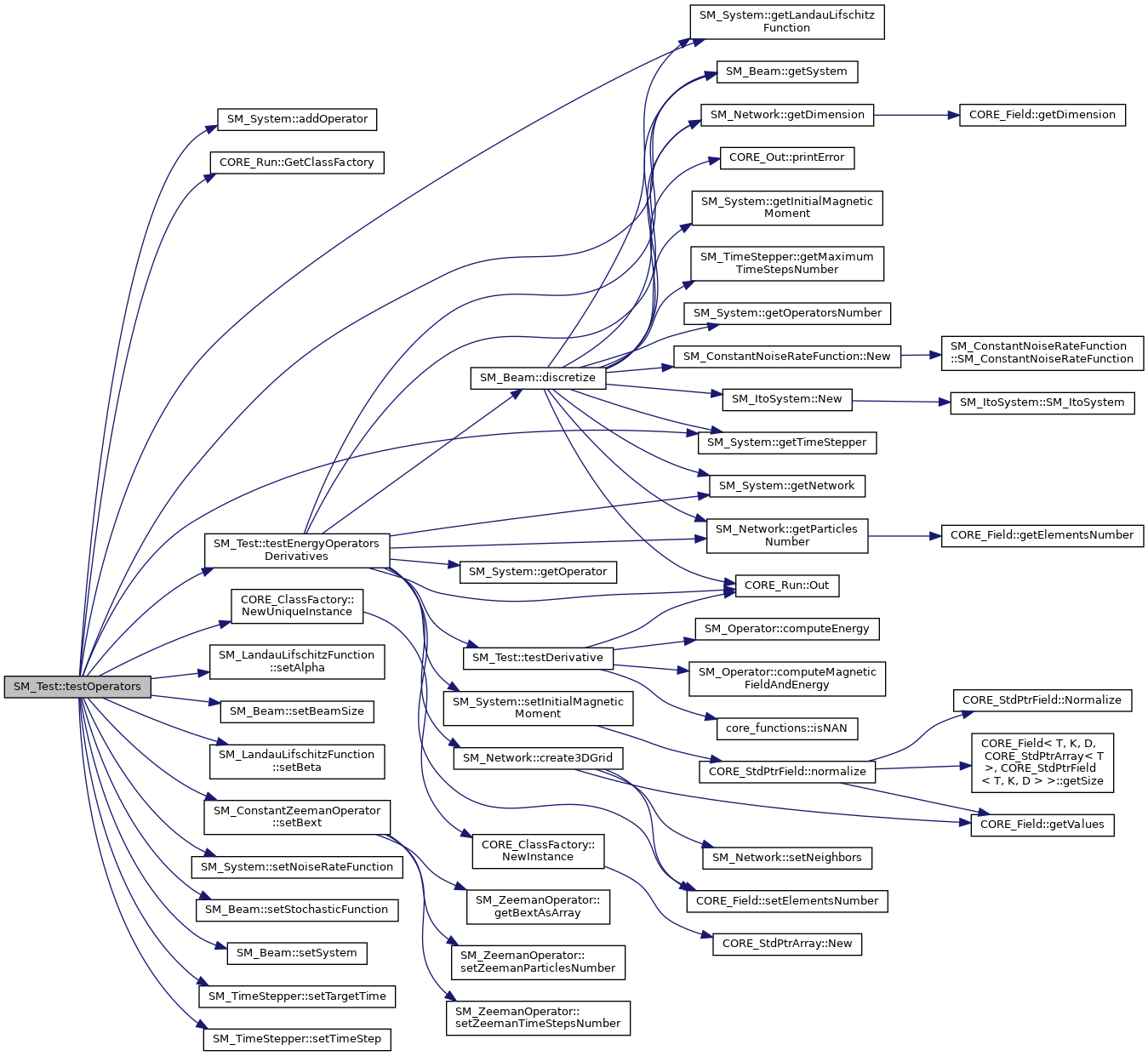

◆ testStringsList()
|
privateinherited |
test the string array
- Parameters
-
[in] runner the runner of the tests [in] options the options of the program
References CORE_VectorList< T, I >::getSize(), CORE_List< T, K, I >::sort(), tBoolean, and tIndex.
Referenced by CORE_Test::primaryTests().


◆ testTypes()
|
privateinherited |
test type
- Parameters
-
[in] runner the runner of the tests [in] options the options of the program
- Returns
- true if the tests have succeeded
References CORE_Object::getClassName(), CORE_Object::getIdentityString(), CORE_Run::Is32Architecture(), CORE_Run::Is64Architecture(), core_functions::max(), core_functions::min(), CORE_Run::Out(), tBoolean, tChar, tComplex, tDouble, tFlag, tFloat, tIndex, tInt, tInteger, tLDouble, tLInt, tLLInt, tMemSize, tReal, tRelativeIndex, tRelativeInteger, tSInt, tString, tUChar, tUInt, tULInt, tULLInt, and tUSInt.
Referenced by CORE_Test::primaryTests().


◆ testVirtualMethods()
|
private |
test the efficiency of the templated method vs virtual method
- Parameters
-
[in] runner : the main caller of the program [in] options options of the program
- Returns
- false if the test has failed
References SM_InverseNoiseRateFunction::computeFunction(), SM_InverseNoiseRateFunction::computeTemplatedFunction(), CORE_Chrono::ConvertDuration(), SM_Network::create3DGrid(), CORE_Run::Out(), CORE_Field< T, K, D, S, I >::setElementsNumber(), CORE_Chrono::start(), CORE_Chrono::stop(), tBoolean, tIndex, tReal, and tUInt.
Referenced by elementaryTests().
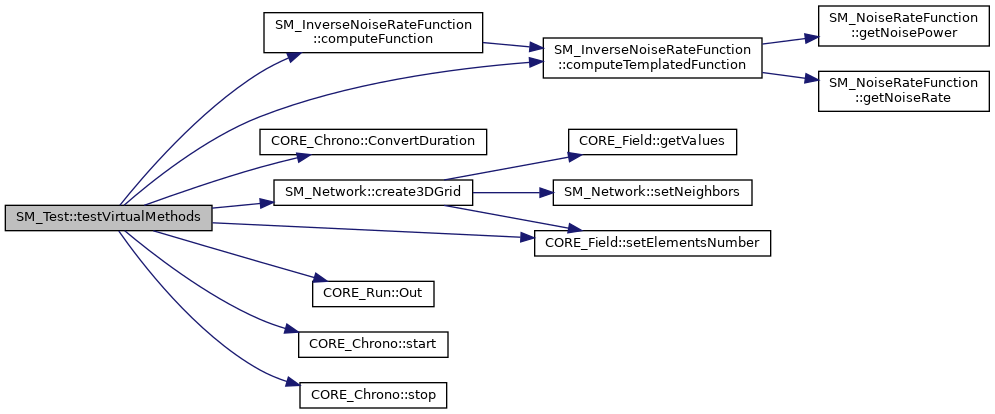

◆ toString()
|
inlinevirtualinherited |
return the string representation of the object node
- Returns
- the string representation of the object node
Reimplemented in SM_TimeStepper, SM_System, SM_StochasticFunction, SM_Network, SM_LandauLifschitzFunction, SM_Beam, CORE_Field< T, K, D, S, I >, CORE_Field< T, K, D, CORE_StdPtrArray< T >, CORE_StdPtrField< T, K, D > >, CORE_Field< T, K, D, CORE_StdValArray< T >, CORE_StdValField< T, K, D > >, CORE_Collection< T, I >, CORE_ClassFactory, and SM_NoiseRateFunction.
References CORE_Object::getIdentityString().
Referenced by SM_Run::run(), CORE_Collection< T, I >::toString(), SM_Beam::toString(), SM_Network::toString(), SM_StochasticFunction::toString(), SM_System::toString(), and SM_TimeStepper::toString().

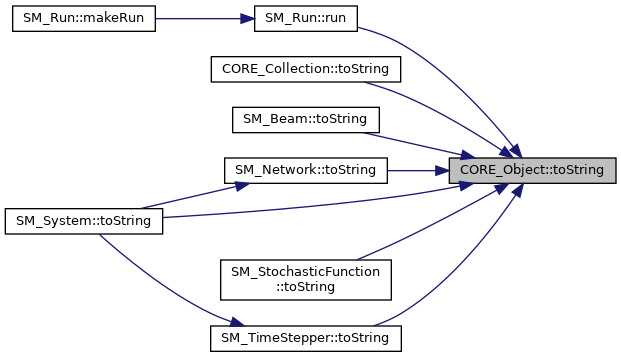
◆ uniformRandomTest()
|
protectedinherited |
randomizer test
- Parameters
-
[out] A : first array for testing [out] B : second array for testing
References CORE_Chrono::ConvertDuration(), CORE_Collection< T, I >::setSize(), CORE_Chrono::start(), CORE_Chrono::stop(), CORE_Array< T, I >::sum(), tBoolean, tIndex, CORE_Array< T, I >::transform(), tReal, tULLInt, and CORE_Array< T, I >::uniformRandomize().

◆ validate()
|
private |
validate the s-trajectory of the beam simulations
- Parameters
-
[in] runner runner of the program [in] path path of the generated files [in] prefix prefix of the generated files [in] beam : data of the simulations [in] s : simulation index to validate
- Returns
- true if the validation succeeded
References core_functions::booleanToString(), SM_Network::getDimension(), CORE_Field< T, K, D, S, I >::getElementsNumber(), SM_Beam::getMagneticMoment(), SM_TimeStepper::getMaximumTimeStepsNumber(), SM_System::getNetwork(), SM_Network::getParticlesNumber(), SM_Beam::getSystem(), SM_TimeStepper::getTimeStep(), SM_System::getTimeStepper(), core_functions::isNAN(), SM_Output::LoadMagneticMomentField(), CORE_Run::Out(), SM_Output::SaveMagneticMomentField(), tBoolean, tIndex, tInteger, tReal, and tString.
Referenced by grid3DParticlesTestCase(), and linedParticlesTestCase().


Member Data Documentation
◆ ALL_TESTS
|
staticprivateinherited |
Referenced by CORE_Test::execute().
◆ CASE_TESTS
|
staticprivateinherited |
Referenced by CORE_Test::execute().
◆ ELEMENTARY_TESTS
|
staticprivateinherited |
Referenced by CORE_Test::execute().
◆ mName
|
privateinherited |
Referenced by CORE_Test::CORE_Test(), CORE_Test::getName(), and CORE_Test::setName().
◆ mThis
|
privateinherited |
Referenced by CORE_Object::getConstSharedPointer(), CORE_Object::getSharedPointer(), and CORE_Object::setThis().
◆ PRIMARY_TESTS
|
staticprivateinherited |
Referenced by CORE_Test::execute().
The documentation for this class was generated from the following files: